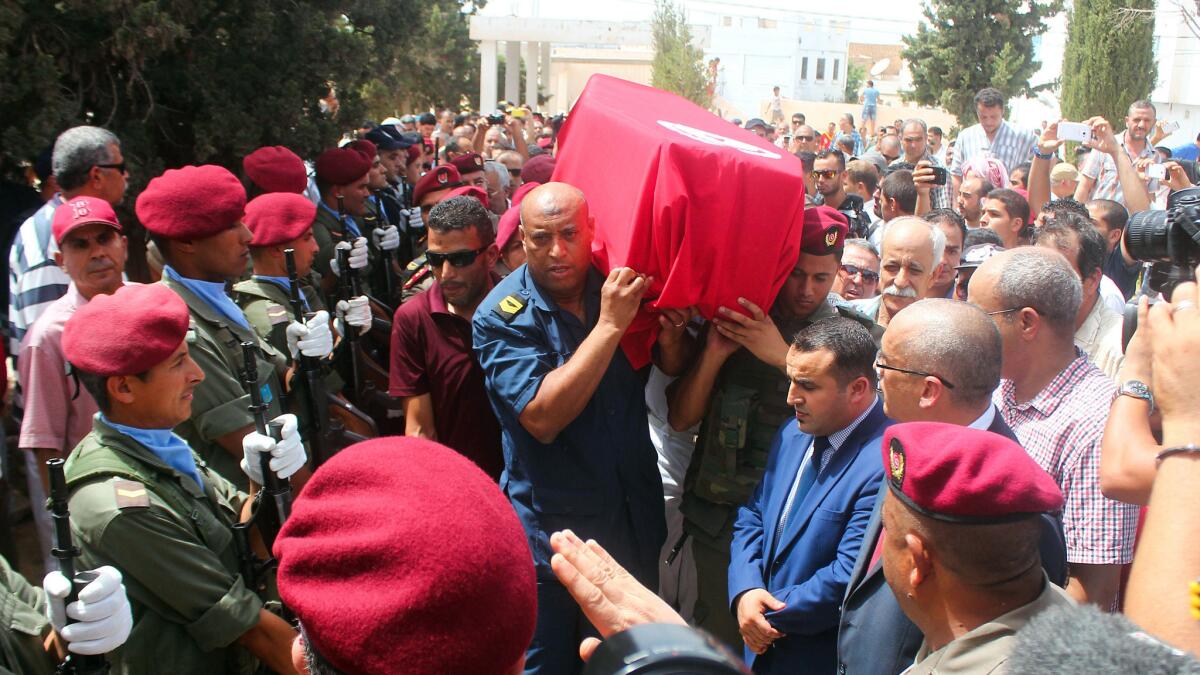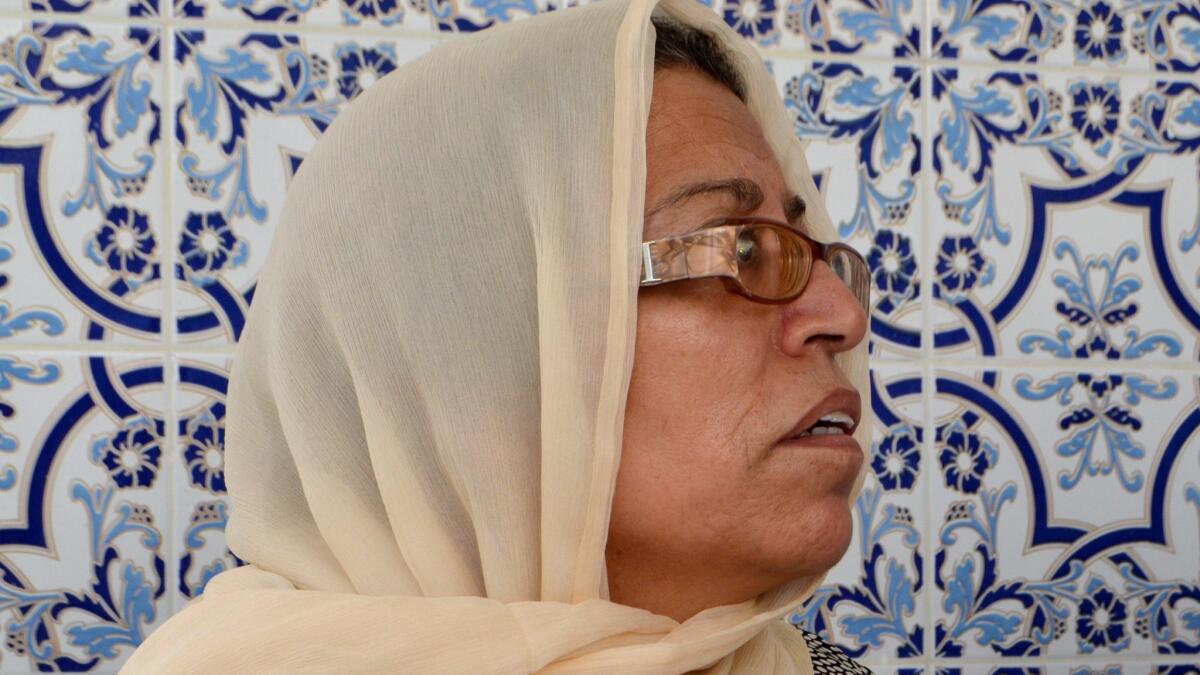A father’s final act was trying to save his son from Islamic State

Reporting from Ksour Essef, Tunisia — Fathi Bayoudh battled for months to save his only son from Islamic State, whose ranks he had joined as a volunteer in Iraq and Syria.
This week, Bayoudh, a respected Tunisian doctor and military officer, thought the nightmare was finally drawing to a close.
Authorities in Turkey, the country bordering Islamic State’s territory in Syria, had 27-year-old Anouar Bayoudh in custody. His parents were on their way to see him for the first time in nearly a year.
It was not to be.
Bayoudh was waiting to pick up his wife at Istanbul’s Ataturk airport Tuesday night when three suicide bombers stormed the airport and unleashed a hail of gunfire and explosions. He was one of 44 people killed in an attack Turkish officials say was unleashed by the very militants who had lured away his son.
Hundreds of men turned out Friday to escort the ambulance that carried Bayoudh, 65, to his final resting place in Ksour Essef, a small town about a three-hour drive from the capital, Tunis.
Mostly, they walked in silence. But the occasional cry of “Allahu Akbar” — “God is great” — grew into a resounding chorus as they entered the sparse, mud-baked graveyard.
The death of Bayoudh, chief of pediatrics at the military hospital in Tunis, was felt deeply in this small North African nation, where the flight of young people into the ranks of Islamic State has become a national tragedy.
Across Tunisia, families like the Bayoudhs, who were raised in a tradition of religious moderation and coexistence, are grappling with the incomprehensible loss of their children to an organization fundamentally opposed to the principles that have defined their lives.
Tunisia, the birthplace of the pro-democracy movements that swept the Middle East and North Africa in 2011, is considered a rare bright spot amid the mostly grim landscape that has emerged in the post “Arab Spring” era.
Unlike elsewhere in the region, secular and Islamist leaders here have worked together to advance political transformation, a quest that earned four civil society groups a Nobel Peace Prize last year.
Still, poverty and joblessness remain widespread, and many young people have grown embittered by unfulfilled promises.
As many as 6,000 Tunisians have joined Islamist groups in Syria and Iraq in recent years, according to a report issued last year by the Soufan Group, a New York-based security consultancy.
While many often assume that it is among the poorest and most marginalized that Islamic State recruiters stalk their prey, the call to violent jihad cuts across all social classes, said Mohamed Iqbel Ben Rejeb, president of the Rescue Association for Tunisians Trapped Abroad, a group that mediates between affected families and the Tunisian authorities.
Anouar Bayoudh, the only child of a comfortable, middle class family, was no exception.
According to the young man’s mother, Saida Bayoudh, he did not grow up particularly religious.
“He didn’t even pray regularly,” she told the French news agency Agence France-Presse, as she received mourners Thursday at the family home in a well-to-do suburb of Tunis. “But he was a good person, polite and respectful.”

Opinions differ about how Anouar Bayoudh became radicalized. An aunt said that a number of young men were “brainwashed” at a neighborhood mosque. Other family members claimed that the young man fell in with a militant woman and grew progressively more angry and aggressive in the months before he left Tunisia.
“He used to spend time with my daughters, laughing and joking, but that stopped,” Toumi Abedallah, a cousin of Anouar’s father, said at Friday’s funeral. “When I met him, his morality had changed. He had started staying away from people, he had started hating them.”
What seems clear is that he was a young man adrift. He studied medicine for a time and also attended aviation school. Then, after a period of unemployment, he embarked on a business administration course.
It would have come as no surprise when he told his parents last fall that he was going to Switzerland for two weeks for a management internship. His mother is now convinced that the offer was a ruse fabricated by Islamic State to ensnare her son.
At first, the couple received daily calls from Geneva, but later Anouar stopped answering the phone, Saida Bayoudh told reporters Friday outside the family home in Ksour Essef.
Worried, they consulted the Tunisian Embassy in Switzerland and learned that Anouar had left at the beginning of November for Turkey, apparently in the company of the militant woman he’d met in Tunisia.
A little more than a month later, he called his parents to say that he and his fiancee were with Islamic State in Iraq, where he had been assigned to an infirmary to tend to the wounded.
They were devastated. For months, Fathi Bayoudh pleaded with his son to come home. Eventually, the tone of Anouar’s messages started to change. He told his parents that Islamic State was “a scam,” and he was afraid of these “monsters.”
In February, they learned that he had crossed the border into Syria and was in the Islamic State’s self-declared capital, Raqqa. Still, the calls kept coming.
Anouar told his parents that Islamic State commanders were recruiting everyone to go to the frontline and begged his father “to help him, to save him, to get him out of there,” his mother said.
The couple reached out to everyone they could think of: government officials in Tunisia and Turkey, even Interpol. Finally, contacts in Syria managed to help Anouar and his fiancee escape Raqqa and surrender to the Free Syrian Army, an anti-government group that is also opposed to Islamic State.
They were detained for about two months, during which Fathi Bayoudh made frequent trips to Turkey to try to negotiate their return to Tunisia.
On Monday, his mother said, he finally received word that their son was in Turkish custody near the country’s border with Syria. He was overjoyed and urged his wife to come quickly to Istanbul.
She thought they would come home together. Instead, she made the journey alone with her husband’s flag-draped coffin.
“My husband … did the impossible to save his son,” she said, looking drawn and pale.
On Thursday, there came word that the Turkish authorities had agreed to a request to extradite Anouar and his fiancee to Tunisia. They are expected back within a week, the state-run Tunis Afrique Presse news agency reported.
Friends and colleagues celebrated the news on Twitter and Facebook, sharing remembrances of the stern but kindly doctor and posting snapshots of him on humanitarian missions at home and abroad.
“You were always the loving father and you never let go,” Ali Gannoun, a university professor in Montpellier, France, wrote in a post that was shared more than 7,000 times on Facebook.
“For many months, you never stopped fighting to get back your son from the murderous mercenaries who indoctrinated him,” it said. “Rest in peace Fethi, you succeeded!”
Special correspondent Cordall reported from Ksour Essef and Times staff writer Zavis from Los Angeles.
Twitter: @alexzavis
ALSO
U.S. congressman: Chechen extremist behind Istanbul attack
U.S.-backed rebels launched their first attack against Islamic State. They lost
Two officers killed as attackers storm Bangladesh restaurant and take hostages
More to Read
Sign up for Essential California
The most important California stories and recommendations in your inbox every morning.
You may occasionally receive promotional content from the Los Angeles Times.










